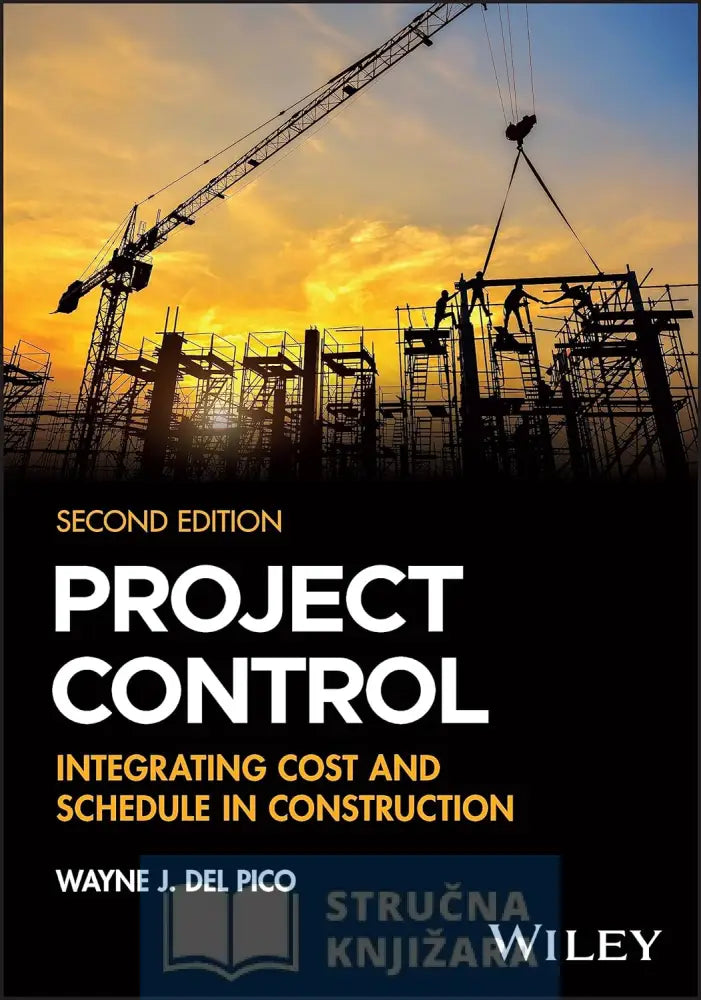Stručna Knjižara
Share
Project Control: Integrating Cost and Schedule in Construction, 2nd Edition - Wayne J. Del Pico
Project Control: Integrating Cost and Schedule in Construction, 2nd Edition - Wayne J. Del Pico
Učitavanje dostupnosti preuzimanje nije moguće
PROJECT CONTROL
Reader-friendly, integrated approach to construction project cost and scheduling control, with all-new pedagogical elements
The Second Edition of Project Control is an introductory practical guide that explores the reasons and methodologies for proper planning, monitoring, and controlling project costs and schedule and shows how productivity models are created, monitored, and controlled, as well as how corrective actions are implemented as deviations from the baseline occur.
Project Control uses simple language to convey project control principles, making it an excellent resource to teach with and learn from in a classroom setting. This Second Edition has been updated with all-new pedagogical elements and ancillary materials for use in the construction project management classroom. This new edition features all-new sections on baseline scheduling, estimate development, probability analysis, and more. ...
ABOUT THE AUTHOR
Wayne J. Del Pico is President of W.J. Del Pico, Inc., where he provides construction management and litigation support services for construction-related matters. He has more than 40 years of experience in construction management, scheduling, and estimating. He has taught several construction courses at Northeastern University in Boston, and is senior affiliate faculty at Wentworth Institute of Technology where he currently teaches programs in construction cost analysis, estimating, project control, and construction scheduling.
TABLE OF CONTENTS
About the Author xii
Preface xiii
1 The Basics 1
The Concept of Project Management 1
History of Project Management 2
Approaches to Project Management 3
The Traditional Approach 4
The Initiating Process 5
The Planning Process 5
The Executing Process 6
The Monitoring and Controlling Process 7
The Closing Process 7
Benefits of Proper Planning 8
The Role of the Project Manager 9
Lead the Project Team 10
Create the Project Plan 10
Develop the Project Schedule 11
Monitor the Progress of the Project 12
Control the Project 12
Take Corrective Action 12
Achieve the Project Goals 13
Goals of the Project 13
Contractual Performance Obligations 13
Financial Objectives 14
Prevent or Minimize Delay 14
Avoid Claims or Litigation 14
Control the O- P- C Relationship 15
Increase Market Share 15
Role of the Contract Documents 15
Study the Plans and Specifications 16
Identify Discrepancies Early 17
Visit the Project Site 17
Understand the Project Constraints 18
Determine Potential Problem Areas 18
Understand Contract Procedures 18
The Schedule and Budget 19
Summary and Key Points 19
Questions for Review 20
2 Introduction to Project Control 23
Overview of Project Control 23
Project Control Terminology 26
Project Control Formulas 35
The Project Control Cycle 35
Plan to Achieve Goals 36
Execute Work According to Plan 37
Measure the Progress 37
Identify Variations 38
Analyze Cause of Variations 38
Implement Corrective Actions 38
Execute Work and Measure Changes 39
Summary and Key Points 39
Questions for Review 40
3 Pre- Construction Planning 41
Initiating the Control Process 41
Pre- Construction Planning 42
Key Personnel and Responsibilities 44
The Contractor’s Group 44
The Design Professional’s Group 50
The Owner’s Group 51
The Regulatory Group 52
The Plan— the Roadmap 53
Establishing a Baseline for Schedule Control 55
Establishing a Baseline for Cost Control 57
The Communication Plan 58
Summary and Key Points 59
Questions for Review 60
4 The Schedule 61
Basic Scheduling Concepts 61
Types of Schedules 63
The Checklist 63
The Schedule Board 64
The Bar Chart 65
The Look- Ahead 66
The Linear Schedule 66
Advanced Scheduling Methods 67
Program Evaluation and Review Technique 67
Critical Path Method (CPM) 68
The CPM Schedule as a Management Tool 68
The Baseline Schedule 69
Tasks 71
The Work Breakdown Structure 71
Task Types 73
Task Descriptions 74
Task Durations 75
Interdependencies 79
Complex Relationships— Lags and Leads 81
Milestones and Constraints 82
Float 84
Updating the Schedule 85
Summary and Key Points 87
Questions for Review 88
5 The Budget 89
Fundamentals of the Estimating Process 89
Types of Estimates 91
Organization of Estimates 92
The Baseline Budget 98
Deconstructing the Estimate to Build the Baseline Budget 103
Project Cost Report 107
The Budget as a Management Tool 108
Summary and Key Points 109
Questions for Review 110
6 Integrating the Schedule and the Budget 111
Schedule of Values 111
Matching Cost Values to Tasks 114
Planned vs. Actual Values 117
Summary and Key Points 121
Questions for Review 122
7 Calculating and Analyzing Progress 125
Why an Accurate Schedule of Values? 125
Measuring Performance 126
Units Completed 126
Incremental Milestone 127
Start/Finish 128
Cost Ratio 128
Experience/Opinion 129
Weighted or Equivalent Units 129
Earned Value 130
Fixed Budget Approach 130
Variable Budget Approach 131
Choosing a Fixed or Variable Approach 132
Schedule and Cost Performance 133
Summary and Key Points 137
Questions for Review 138
8 Analyzing and Reporting Variances in Schedule and Cost 139
Understanding Project Analyses 139
S- Curves 139
Tracking Gantt Chart 144
Control Charts 144
SPI and CPI Charts 146
X Contents Causes of Variances 148
Cost Variances 148
Schedule Variances 148
Variance Thresholds 149
Root Cause Analysis 151
Reporting Project Status 153
Summary and Key Points 155
Questions for Review 157
9 Recognizing Trends and Forecasting Performance 159
Recognizing Trends 159
Using Trends to Forecast 162
Estimate at Completion 162
Estimate to Complete 163
Variance at Completion 164
To- Complete Performance Index 164
Project Percentage Analysis 166
Why All the Analysis? 167
Summary and Key Points 169
Questions for Review 169
10 Productivity 171
Understanding Productivity 171
Productivity Index 172
Factors Affecting Construction Productivity 174
Controllable Factors Affecting Productivity 174
Uncontrollable Factors Affecting Productivity 175
Recommendations for Improving Productivity 175
Summary and Key Points 177
Questions for Review 177
11 Acceleration and Schedule Compression 179
Acceleration 179
Actual Acceleration 180
Constructive Acceleration 181
Forced Acceleration 182
Schedule Compression 183
Time- Cost Trade- Off Analysis 184
Time- Cost Trade- Off Concepts 185
Recovery Schedule 190
Summary and Key Points 191
Questions for Review 193
12 Resource Management 195
Resources 195
Resource Allocation 196
Resource Management 197
Resource Profile 199
Splitting Tasks 201
Material Management 201
Material Management in Practice 203
Tools for Resource Management 204
Summary and Key Points 204
Questions for Review 205
13 Risk Management 207
Components of Risk Management 207
Risk Identification 208
Risk Assessment 209
Risk Response Plan 211
Risk Response Control 213
Risk Contingency Planning 214
Contingency Plan Funding 215
Probability Analysis in Scheduling 216
Contract Type and Risk 222
Stipulated Sum 223
Cost of Work Plus Fee 223
Cost of Work Plus Fee with a GMP 223
Design Build 224
Construction Management 224
Partnering 225
Contract Modifications and Impact on Risk 225
Summary and Key Points 226
Questions for Review 227
14 Project Closeout 229
Project Documentation 229
Initiation of Project Closeout 230
Objectives of the Closeout Process 231
Contract Closeout 232
Administrative Closeout 233
Archiving Project Files 233
Claims and Disputes 234
Lessons Learned Meeting 235
Lessons Learned Documentation 236
Project Closeout Report 236
Summary and Key Points 237
Questions for Review 238
Case Study 239
Appendix A Questions for Review and Answers 251
Index 269
 Graditeljstvo
Graditeljstvo - Ostalo
Organizacija građenja
Sve knjige
Wiley
Graditeljstvo
Graditeljstvo - Ostalo
Organizacija građenja
Sve knjige
Wiley
Česta pitanja
Koji su Načini plaćanja?
Koji su Načini plaćanja?
- Kreditnom ili debitnom karticom
- Pouzećem – plaćanje po primitku paketa direktno djelatniku pošte
- Virmanom (uplata na žiro račun) -plaćanje Internet bankarstvom, uplatnicom u pošti, banci
Koliki su troškovi poštarine i koji je rok isporuke?
Koliki su troškovi poštarine i koji je rok isporuke?
Iznos narudžbe (vrijednost košarice) i troškovi slanja na adrese u Republici Hrvatskoj
Do 150,00 € -> 7,00 €
Iznad 150,00 € -> Gratis
Iznos narudžbe (vrijednost košarice) i troškovi slanja u inozemstvo
Do 26,54 € -> 20,97 €
Za svakih slijedećih 26,54 € vrijednosti košarice (do maksimalne vrijednosti košarice 132,72 €) dodaje se 5,30 €
Od 132,72 € vrijednosti košarice nadalje trošak dostave iznosi 46,18 €
Rok isporuke je od 14 do 30 radnih dana (u radne dane ne spadaju vikendi, blagdani i državni praznici).
U slučaju nepredviđene situacije, rok dostave može se produljiti, ali o tome ćete biti naknadno obaviješteni (mailom ili telefonski).
Da li je moguće osobno preuzimanje naručenih knjiga na adresi?
Da li je moguće osobno preuzimanje naručenih knjiga na adresi?
Kada su knjige dostupne, moguće je osobno preuzimanje knjiga na adresi ureda Ivane Brlić Mažuranić 72 (Malešnica), 10090 Zagreb uz obaveznu prethodnu najavu na telefon 00385 (0)1 3731 748.
Trebate pomoć oko kupovine putem naše internet stranice www.strucnaknjizara.com?
Trebate pomoć oko kupovine putem naše internet stranice www.strucnaknjizara.com?
Slobodno nas kontaktirajte putem naše e-mail adrese: info@strucnaknjizara.com ili telefonski na broj: 00385 (0)1 3731 748.
Ako se ne snalazite ili ne želite naručiti knjige preko internet trgovine, slobodno nam pošaljite direktan upit/narudžbu na e-mail na info@strucnaknjizara.com.
Za narudžbu su potrebni sljedeći podaci:
Točan naslov željene knjige i količina,
ime i prezime,
adresa dostave,
e-mail adresa i
telefonski broj.


Tražite stručnu knjigu i ne možete da ju pronađete?
Javite nam, potrudit ćemo se da je pronađemo za Vas.
Newsletter prijava
...prijavi se na listu i prati akcije
